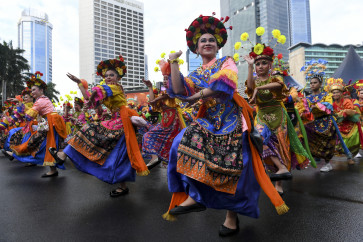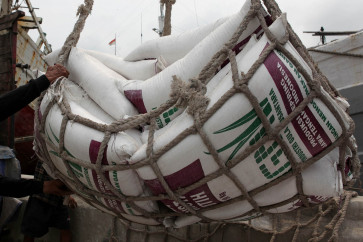Popular Reads
Top Results
Can't find what you're looking for?
View all search resultsPopular Reads
Top Results
Can't find what you're looking for?
View all search resultsIssue: Wearing Javanese clothing as new policy
Feb
Change text size
Gift Premium Articles
to Anyone
F
eb. 17, Online
Surakarta Mayor Joko “Jokowi” Widodo and Deputy Mayor FX Hadi Rudyatmo sported a new look on Thursday, as they wore men’s traditional Javanese clothing, known as beskap, to work.
Jokowi and his deputy departed from the usual dress code to introduce a new policy that, starting from next week, will require all public officials in Surakarta to wear beskap or kebaya (women’s traditional Javanese clothing) to work on Thursdays.
“This policy aims to preserve traditional attire. If no one wears it, it will dissapear!” Jokowi said as quoted by kompas.com. Jokowi further elaborated that the newly introduced policy aimed to boost the income of cottage industries producing batik, kebaya and blangkon (traditional Javanese hat). “If no one wears blangkon, then the producers of blangkon will be reluctant to produce it, since there is no one to buy it,” Jokowi added.
Your comments:
The policy is against human rights.
Abdul Hadi
Jakarta
The officials in Surakarta are only trying to save a piece of Indonesian culture and tradition from the rampant and terrifying Arabization of the archipelago.
Bona
Jakarta
I am not sure if the policy is against human rights. I think, the benefits of this policy are greater than the disadvantages.
The traditional clothes designers, who I am sure are mostly not rich, don’t have to worry about losing their job.
Ikbal
Jakarta
I strongly agree with this policy, since it will show that we are proud of wearing beskap/kebaya (Javanese tradition attires) in daily life.
Bramadi S
Blitar, East Java
It is definitely another restriction on individual freedom of expression. There was a point in time when students in Indonesia were obliged to wear batik every Friday.
Did that make us preserve the batik culture?
No! The reason why batik is more popular now is Malaysia tried to claim batik for itself, and because of the creativity of fashion designers in modernizing the fabric.
Instead of forcing people, we have to do something. Surely, there must be other ways to preserve culture!
I do believe the government should seek ways to preserve this, as opposed to forcefully injecting
foreign culture and perception of how people (read women) should dress.
I still think this is pack mentalitythinking on a larger scale: Ways the Indonesian authority, and society for that matter, can regulate individuals. In a way, it restricts freedom of expression.
That an individual should dress, act, behave uniformly to be identified as a member of a group
instead of each being recognized and appreciated as an individual. It is similar to the obligation to wear hijab, though less stringent.
Anak Rantau
Singapore










